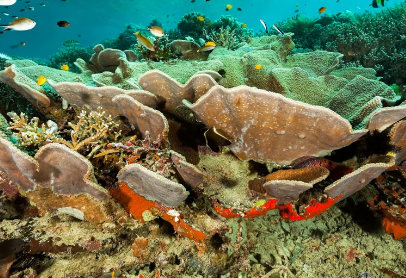Fossil Fuel Expansion Threatens Coral Triangle Biodiversity
At COP16 of the Convention on Biological Diversity, a critical report brought to light the dangers posed by fossil fuel expansion to the Coral Triangle. This region, known as the ‘Amazon of the seas’, is one of the most biodiverse marine areas globally. It spans over 10 million square kilometers and includes several Southeast Asian nations.
The Coral Triangle
The Coral Triangle houses 76% of the world’s coral species. It supports over 120 million people who rely on its resources for their livelihoods. Countries within this region include Indonesia, Malaysia, Papua New Guinea, Singapore, the Philippines, Timor-Leste, and the Solomon Islands.
Fossil Fuel Threats
The report, titled Coral Triangle at Risk: Fossil Fuel Threats and Impacts, outlines alarming statistics. More than 100 offshore oil and gas blocks are currently operational, covering over 120,000 square kilometers. An additional 450 blocks are under exploration, potentially affecting 16% of the Coral Triangle if fully developed.
Impact on Critical Habitats
Significant portions of vital habitats are threatened. Overlaps with oil and gas blocks affect 24% of coral reefs, 22% of seagrass, and 37% of mangroves. Since 2020, 793 oil slicks have been detected, primarily due to bilge dumping from ships, affecting over 24,000 square kilometers.
Notable Incidents
One major incident is the Princess Empress oil spill in 2023, which impacted over 20 marine protected areas and affected 21,000 families. The economic damages were about 3.8 billion Philippine pesos, disrupting local fishing industries and harming marine habitats.
Liquefied Natural Gas Infrastructure
The report also addresses the rapid expansion of liquefied natural gas (LNG) infrastructure in Southeast Asia. Between 2016 and 2022, over $30 billion was invested in LNG. Currently, 19 LNG terminals operate in the Coral Triangle, with more planned, increasing risks to marine ecosystems.
Effects on Marine Life
Fossil fuel expansion threatens biodiversity. Noise pollution from shipping and exploration disrupts marine life, particularly species like whales and dolphins. Seismic exploration and commercial shipping create loud noises that interfere with communication and navigation, leading to behavioral changes and increased mortality rates.
Protected Areas at Risk
Sixteen percent of marine protected areas overlap with oil and gas blocks. This poses an important threat to sensitive ecosystems. Eighty MPAs are completely covered by fossil fuel activities, raising serious concerns for biodiversity conservation.
Local Community Impact
The consequences of oil spills extend beyond environmental damage. Local communities face severe threats. Countries dependent on fossil fuels often incur long-term debt due to resource exploitation. The Princess Empress spill caused school closures and health issues among residents, denoting their vulnerability.
Cultural Heritage Threats
In South Bali, proposed LNG projects threaten sacred sites of indigenous communities. Local leaders express concerns that these developments could harm both the environment and cultural heritage.
Recommended Actions
The report recommends urgent actions to protect the Coral Triangle. A moratorium should halt oil, gas, mining, and industrial activities in sensitive areas. The development of renewable energy plans is essential to reduce reliance on fossil fuels, especially LNG. Additionally, the Coral Triangle should be classified as a Particularly Sensitive Sea Area (PSSA) for special protection.
Despite the threats, local communities are mobilizing. In the Philippines, grassroots movements like Protect VIP oppose fossil fuel projects and seek accountability, especially following the Princess Empress oil spill.
Month: Current Affairs - October, 2024
Category: Environment Current Affairs








